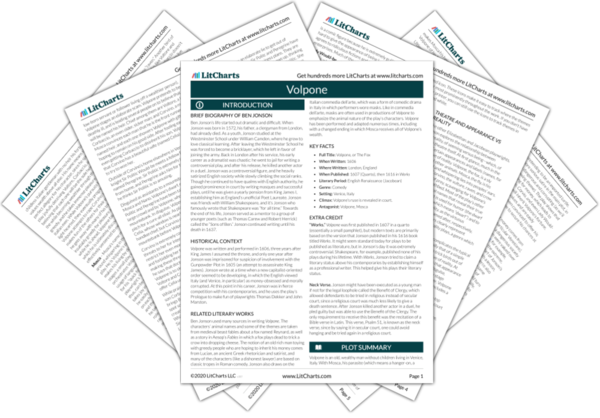Theatre and Appearance vs Reality
Like other Elizabethan and Jacobean playwrights, Jonson explores the relationship between appearance and reality, of seeming versus being—which, of course, evokes the theatre itself. At first glance, much in the play is as it seems. Certain appearances and labels (names, for example) are indicative of reality. Volpone, the fox, is a sly trickster hoping to fool other animals. Mosca, the fly, is his servant, buzzing around and whispering lies into peoples’ ears. Voltore…
read analysis of Theatre and Appearance vs RealityMoney and Commerce
The driving force of the play’s plot is desire for money, which propels the three men trying to steal Volpone’s fortune and drives Volpone in his attempt to manipulate and swindle them. In the play’s opening scene, Volpone shows how much the Italians value money when he delivers a blasphemous speech in which he calls money “the world’s soul” and praises it like a god. Money, he says, is everything, and whoever has money…
read analysis of Money and CommerceGreed and Corruption
In addition to having a reputation for commerce, Venice (and Italy in general) was stereotypically known for greed and corruption, both moral and political. Volpone’s subplot involves fear of spying, but the play’s primary interest in corruption is of a different kind; more than political corruption, Volpone explores the ways in which people can become morally corrupted.
The Italian men in the play are all corrupted by avarice, which means greed or excessive desire…
read analysis of Greed and Corruption
Gender Roles and Women
Most of the play’s characters are men who operate in the traditionally male sphere of commerce. At the time in which the play is set, men were wholly responsible for finance and they were expected to have power over women in relationships, roles that most of the male characters in the play firmly occupy. However, the play also compares male authority, love, sex, and courtship to the social expectations of women by exploring two examples…
read analysis of Gender Roles and WomenLanguage
Throughout Volpone, Jonson celebrates quick wit (especially his own), wordplay, and language itself. The play begins with the “Argument” and the “Prologue,” both of which stress the playwright’s mastery of language. The argument is given in a masterful acrostic, in which each of the seven verses begins with one of the letters of VOLPONE. The prologue then emphasizes that the play itself is of high quality, and assures the audience that the play was…
read analysis of Language






